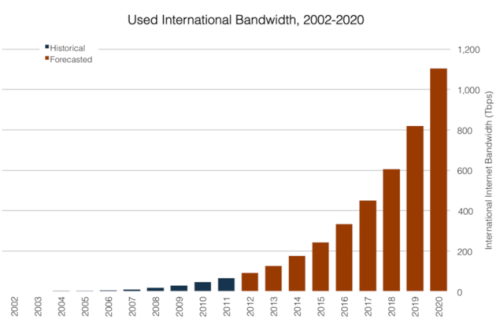Ricochet is the best place on the internet to discuss the issues of the day, either through commenting on posts or writing your own for our active and dynamic community in a fully moderated environment. In addition, the Ricochet Audio Network offers over 50 original podcasts with new episodes released every day.
 The Knave Detector
The Knave Detector
 I recently read a comment that Marx is useful to us because his philosophy allows us to easily identify fools and knaves. I’ve personally observed that the net neutrality debate is useful for much the same reason.
I recently read a comment that Marx is useful to us because his philosophy allows us to easily identify fools and knaves. I’ve personally observed that the net neutrality debate is useful for much the same reason.
The FCC is currently considering a proposal that has many up in arms. Consider this, from the activist group SumOfUs:
Comcast, AT&T, and Verizon want to control what we can and cannot do online — and they’re about to get their wish.
Their lobbyists and lawyers have taken over the FCC — the agency meant to keep them in check. Now, the former lobbyist running the FCC is about to announce new rules that will kill Net Neutrality — the rule that stops Comcast, AT&T, or Verizon from deciding which sites you’re allowed to visit.
Does Guinness track the maximum number of errors that have ever appeared in writing for certain word counts? If so, the above statements are clearly in the running for the 75 word or less category. Rather than list them out in a fact-checking exercise, I’d like to ask some questions of those passing this drivel around on social media.
Why would Comcast, AT&T, and Verizon want to control what you can and cannot do online? Are all of these companies run by fascists who wish to force a specific world view on us? Are they run by puritans who are going to do away with porn? What could the aim of these for-profit companies possibly be?
What if — and I’m just spitballing here — their motivation was simply profit? What if they don’t care at all what you do online as long as they can make money providing you with internet access? What if they are having trouble adding bandwidth fast enough to keep up with demand, and are desperately looking for solutions aside from doubling the rates they charge their customers?

As you can see, internet usage is doubling approximately every two years, driven largely by an ever-increasing amount of streaming video. What the chart doesn’t show you is that the amount of bandwidth available is not doubling every two years.
Internet providers face a dilemma: how do they acquire the funds to do the R&D and infrastructure improvements required to keep up with our insatiable demand for bandwidth? One solution is for them to dramatically increase rates on all of their customers; an idea that will lead to a revolt among average Americans who just want to stream their favorite show at the end of a hard day and care little about the future calamity of a bottlenecked information superhighway. They face a similar backlash if they throttle back the bandwidth of all of their customers equally. Instead they have settled on a third option where they will charge websites extra for faster service.
The practical effect is that those sites that use the majority of the bandwidth will have to shell out the money required to add more. Naturally, Netflix, Google, and others are none too pleased with this outcome.
According to recent news reports, the Commission intends to propose rules that would enable phone and cable Internet service providers to discriminate both technically and financially against Internet companies and to impose new tolls on them. If these reports are correct, this represents a grave threat to the Internet.
This is creative usage of the word ‘discrimination’. In much the same way, car companies apparently discriminate against customers when they charge them more for a car with greater horsepower. I wonder if this represents a grave threat to travel?
The problem for the internet providers is the simplicity of the narrative. Most of us have had bad encounters with these companies and hold them in low regard. Meanwhile, we tend to see only the upside of YouTube and Google, as it’s natural to be less critical of services we seemingly get for free.
One of the more amusing aspects of this entire story is seeing mega corporations such as Google and Facebook described as “technology innovators” to avoid framing this as a dispute between massive companies about who should pay for what.
Instead of permitting individualized bargaining and discrimination, the Commission’s rules should protect users and Internet companies on both fixed and mobile platforms against blocking, discrimination, and paid prioritization, and should make the market for Internet services more transparent. The rules should provide certainty to all market participants and keep the costs of regulation low.
God forbid these businesses engage in “individualized bargaining”. Surely Google doesn’t offer superior services for an extra cost. And of course Netflix would never introduce any type of tiered pricing system that includes extra benefits to those who would pay more.
These companies would prefer the FCC pass new net neutrality rules that would prevent them from having to pay more in order to receive excellent bandwidth. I would prefer Google provide me with an unlimited amount of file and e-mail storage at no extra cost, yet somehow I suspect they would balk at the idea of users lobbying to have a regulation passed to avoid having to pay them extra for these services.
The spectacle of Google using the government to avoid having to pay more in a market arrangement while accusing the internet providers of doing the same would be funny if it weren’t so effective. One is forced to wonder what it would take for those who fear corporations above all else to realize that when they empower government to insert itself in these matters, they have really only empowered those corporations to engage in regulatory capture.
I suppose they’d have to first know what regulatory capture is. Hardly time to bother with that when they could be streaming Breaking Bad on Netflix.
Published in General




We distrust government power and big government.
We distrust unions and the power they gain by forcing people to become unionized.
But we have become so enamored of the free market and capitalism (rightly so) as the alternative to top-down government control, that we often give business monopolies a free pass in our thinking. The power they wield is no less susceptible to being abused.
Here’s something from the anti-Net-Neutrality side:
Do you think he’s making good points? Do you buy his arguments? Why or why not?
I do think he had some strong points. Particularly the effect on innovation of restricting how ISP’s can choose to structure their business.
However, he loses points in a few areas, especially where he says that concerns about content differentiation/discrimination on the part of the ISP’s are absurd.
Just to nitpick a bit on that point: Most (though certainly not all – Microsoft being an example of the latter) monopolies and cartels come into existence because of government regulations. The “last leg” issue of ‘net access, for instance, is almost always due to municipalities and/or state “utility regulation boards” (also known as consumer protection agencies or other various similar concoctions) granting access monopolies, while similtaneously regulating the ability of carriers to raise rates.
Only 1 cable provider, only 1 phone / DSL provider. Only alternative is satellite internet, which is dodgy (though worlds better than it was 10 years ago).
I would love to see this busted up.
At common law, common carrier status would mean that you had to carry everyone’s signals, just as mail carriers have to take mail, hotels have to offer rooms, etc.
It does not mean that UPS cannot offer express mail (although they can’t offer USPS trademarked Express Mail). It does not mean that hotels can’t sell you penthouses.
The video would be completely correct in its analogies to other common carrier issues if the threat was that ISPs would totally block off particular sites, but Verizon just wants to offer better services to the providers that pay them for better services.
What common carrier status means here, though, is that the regulatory agencies get to make up law governing them on an extremely broad basis. ISPs are already mostly prevented from shutting off content on a First Amendment Common Carrier basis.
I think that the thing that irritates me most is the use of “rights” to mean “things that would be a good idea” and “customer has paid for” to demand that regulators dictate contract terms.
I’m not at all sure that Verizon (for example) wants to do just that.
Otherwise, UPS and USPS can indeed offer express mail, but they can’t offer express mail exclusively to me and exclusive of you. Is that correct?
James,
The video bugs me to for many of the reasons you’ve pointed out. We’re not dealing with UPS, we’re dealing with a network market. Our analogies should be to credit cards and railroads and other types of 2-sided markets (I think that’s the right name) which are regulated in similar fashions, which are in turn common carrier-ish.
The concern is not that ISPs would charge more to some companies and less to others -they can do that under CC status, and everyone wants them to do so. Netflix and Amazon want to pay more so that more of their customers can pay lower subscriptions to Comcast, making the network more valuable to Netflix and Amazon (since they can reach more people on a single network). The concern is that Comcast will use its monopoly status to extract all the value from Netflix and Amazon -and any time Netflix and Amazon find a way to make a little extra money, Comcast will step in and try to extract that value as well. This means that Netflix and Amazon have no incentive to innovate, and that transaction costs eventually destroy the value of the network.
I am nominally in favor of Common Carrier status because it streamlines those transaction costs and more clearly defines property rights to the network. It is true that Comcast owns the network. It is also true that the network is worthless without the content providers. If the providers and ISP are the same (as in the case of Google’s internal network) there is no problem, but when they are separate we have a combined monopoly and commons problem.
Common Carrier is a long established Common Law method of adjudicating that complicated mess. The owner (that’s the monopolist) of the network may charge what they like, but the price must be posted, consistent within categories, and notice must be given before it changes. Anyone may use the network (that’s the commons), but they must accept the owner’s terms on a take-it-or-leave it basis. Thus, transaction costs are reduced and both monopolist and providers have an incentive to preserve the well functioning network.
The catch is, this is not what the FCC wants to do at all by moving ISPs to Title II.
Hence why I prefer Congress write the law.
I’m not sure what this means, but I think that the answer is probably that they can, so long as they don’t discriminate on invidious grounds.
Is there anything in particular that you worry about Verizon doing?
FCC Net Neutrality Proposal is Already Ruining the Internet